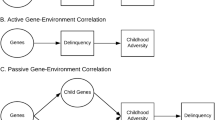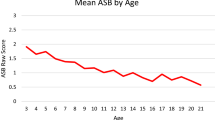Abstract
Background
There is a vast literature on the negative associations between spanking in childhood and various psychosocial developmental outcomes; yet, control for potential genetic confounds is rare.
Objectives
The current research aimed to provide probable ranges of estimates of the degree to which genetic and nonshared environmental covariation could explain the reported phenotypic effects in the Gershoff and Grogan-Kaylor (Gershoff and Grogan-Kaylor, Family Relations 65:490–501, 2016a, Gershoff and Grogan-Kaylor, Journal of Family Psychology 30:453, 2016b) meta-analysis of spanking.
Participants and setting.
The analytic sample for Study 1 was secured from the Children of the National Longitudinal Survey of Youth (CNLSY) and consisted of 2868 respondents (siblings and half-siblings). The data for Study 2 were secured from the published literature.
Methods
Study 1 analyzed the data from the CNLSY using univariate ACE models and bivariate Cholesky decomposition models. Study 2 used simulation modeling to provide a summative evaluation of the psychosocial effects of spanking with regard to genetic and nonshared environmental covariation.
Results
Study 1 replicated previous work showing that associations between spanking and outcomes of delinquency, depression, and alcohol use were explained by moderate-to-large degrees of genetic covariation and small-to-moderate degrees of nonshared environmental covariation. Simulation estimates from Study 2 suggest that genetic covariation accounts for a substantial amount of the phenotypic effect between spanking and psychosocial outcomes (≈60–80%), with the remainder attributable to nonshared environmental covariation (≈0–40%).
Conclusions
Results of the current research indicate that continued work on the effects of spanking is best served by behavior genetic research on a broader range of outcomes than what is currently available.


Similar content being viewed by others
Notes
“Spanking,” “corporal punishment,” and “mild physical punishment” are viewed largely as synonymous. Here, we maintain the use of the term “spanking” for consistency throughout, as defined above.
References
Afifi, T. O., Ford, D., Gershoff, E. T., Merrick, M., Grogan-Kaylor, A., Ports, K. A., MacMillan, H. L., Holden, G. W., Taylor, C. A., Lee, S. J., & Peters Bennett, R. (2017). Spanking and adult mental health impairment: The case for the designation of spanking as an adverse childhood experience. Child Abuse and Neglect, 71, 24–31.
Barnes, J. C., Barbaro, N., Boutwell, B. B., & Shackeford, T. K. (2017). Technical appendix for: Genetic confounding of the relationship between father absence and age at menarche. Evolution and Human Behavior, 38,. https://doi.org/10.1016/j.evolhumbehav.2016.11.007
Barnes, J. C., Boutwell, B. B., Beaver, K. M., & Gibson, C. L. (2013). Analyzing the origins of childhood externalizing behavioral problems. Developmental Psychology, 49, 2272–2284.
Barnes, J. C., Boutwell, B. B., Beaver, K. M., Gibson, C. L., & Wright, J. P. (2014a). On the consequences of ignoring genetic influences in criminological research. Journal of Criminal Justice, 42, 471–482.
Barnes, J. C., Wright, J. P., Boutwell, B. B., Schwartz, J. A., Connolly, E. J., Nedelec, J. L., & Beaver, K. M. (2014b). Demonstrating the validity of twin research in criminology. Criminology, 52, 588–626.
Benjet, C., & Kazdin, A. E. (2003). Spanking children: The controversies, findings, and new directions. Clinical Psychology Review, 23, 197–224.
Bhattacharjee S. & Sarkar A. (2017). Equal environments assumption. In: Vonk J., Shackelford T. (Eds.), Encyclopedia of Animal Cognition and Behavior. Springer.
Boutwell, B. B., & Adams, C. D. (2020). A research note on Mendelian randomization and causal inference in criminology: Promises and considerations. Journal of Experimental Criminology, 1–12.
Burt, S. A. (2009). Rethinking environmental contributions to child and adolescent psychopathology: A meta-analysis of shared environmental influences. Psychological Bulletin, 135, 608–637.
Button, T. M., Lau, J. Y., Maughan, B., & Eley, T. C. (2008). Parental punitive discipline, negative life events and gene–environment interplay in the development of externalizing behavior. Psychological Medicine, 38, 29–39.
Cecil, C. A., Barker, E. D., Jaffee, S. R., & Viding, E. (2012). Association between maladaptive parenting and child self-control over time: Cross-lagged study using a monozygotic twin difference design. The British Journal of Psychiatry, 201, 291–297.
Chabris, C. F., Lee, J. J., Cesarini, D., Benjamin, D. J., & Laibson, D. I. (2015). The fourth law of behavior genetics. Current Directions in Psychological Science, 24, 304–312.
Connolly, E. J., Schwartz, J. A., Nedelec, J. L., Beaver, K. M., & Barnes, J. C. (2015). Different slopes for different folks: Genetic influences on growth in delinquent peer association and delinquency during adolescence. Journal of Youth and Adolescence, 44, 1413–1427.
Danese, A., & Tan, M. (2014). Childhood maltreatment and obesity: Systematic review and meta-analysis. Molecular Psychiatry, 19(5), 544–554.
Durrant, J., & Ensom, R. (2012). Physical punishment of children: Lessons from 20 years of research. Canadian Medical Association Journal, 184, 1373–1377.
Ferguson, C. J. (2013). Spanking, corporal punishment and negative long-term outcomes: A meta-analytic review of longitudinal studies. Clinical Psychology Review, 33, 196–208.
Gershoff, E. T. (2002). Corporal punishment by parents and associated child behaviors and experiences: A meta-analytic and theoretical review. Psychological Bulletin, 128, 539–579.
Gershoff, E. T. (2013). Spanking and child development: We know enough now to stop hitting our children. Child Development Perspectives, 7, 133–137.
Gershoff, E. T., Goodman, G. S., Miller-Perrin, C. L., Holden, G. W., Jackson, Y., & Kazdin, A. E. (2018). The strength of the causal evidence against physical punishment of children and its implications for parents, psychologists, and policymakers. American Psychologist, 73, 626–638.
Gershoff, E. T., & Grogan-Kaylor, A. (2016a). Race as a moderator of associations between spanking and child outcomes. Family Relations, 65, 490–501.
Gershoff, E. T., & Grogan-Kaylor, A. (2016b). Spanking and child outcomes: Old controversies and new meta-analyses. Journal of Family Psychology, 30, 453.
Grogan-Kaylor, A., Ma, J., & Graham-Bermann, S. A. (2018). The case against physical punishment. Current Opinion in Psychology, 19, 22–27.
Hao, L., & Matsueda, R. L. (2006). Family dynamics through childhood: A sibling model of behavior problems. Social Science Research, 35, 500–524.
Harden, K. P., Quinn, P. D., & Tucker-Drob, E. M. (2012). Genetically influenced change in sensation seeking drives the rise of delinquent behavior during adolescence. Developmental Science, 15, 150–163.
Holland, W. (1986). Statistics and causal inference. Journal of the American Statistical Association, 81, 945–960.
Infurna, M. R., Reichl, C., Parzer, P., Schimmenti, A., Bifulco, A., & Kaess, M. (2016). Associations between depression and specific childhood experiences of abuse and neglect: A meta-analysis. Journal of Affective Disorders, 190, 47–55.
Jaffee, S. R., Caspi, A., Moffitt, T. E., Polo-Tomas, M., Price, T. S., & Taylor, A. (2004). The limits of child effects: Evidence for genetically mediated child effects on corporal punishment but not on physical maltreatment. Developmental Psychology, 40, 1047.
Kendler, K. S., Gardner, C. O., & Prescott, C. A. (1998). A population-based twin study of self-esteem and gender. Psychological Medicine, 28, 1403–1409.
Knafo, A., & Plomin, R. (2006). Prosocial behavior from early to middle childhood: Genetic and environmental influences on stability and change. Developmental Psychology, 42, 771.
Lahey, B. B., Van Hulle, C. A., Waldman, I. D., Rodgers, J. L., D’Onofrio, B. M., Pedlow, S., & Keenan, K. (2006). Testing descriptive hypotheses regarding sex differences in the development of conduct problems and delinquency. Journal of Abnormal Child Psychology, 34, 730–748.
Lansford, J. E., Wager, L. B., Bates, J. E., Pettit, G. S., & Dodge, K. A. (2012). Forms of spanking and children’s externalizing behaviors. Family Relations, 61, 224–236.
Larzelere, R. E., & Kuhn, B. R. (2005). Comparing child outcomes of physical punishment and alternative disciplinary tactics: A metaanalysis. Clinical Child and Family Psychology Review, 8, 1–37.
Larzelere, R. E., Kuhn, B. R., & Johnson, B. (2004). The intervention selection bias: An underrecognized confound in intervention research. Psychological Bulletin, 130, 289–303.
Lee, J. J. (2012). Correlation and causation in the study of personality. European Journal of Personality, 26(4), 372–390.
Lynch, S. K., Turkheimer, E., D’onofrio, B. M., Mendle, J., Emery, R. E., Slutske, W. S., & Martin, N. G. (2006). A genetically informed study of the association between harsh punishment and offspring behavioral problems. Journal of Family Psychology, 20, 190–198.
Muthén, L. K., & Muthén, B. O. (1998–2018). Mplus user’s guide. Los Angeles, CA: Muthén and Muthén.
Neiss, M. B., Sedikides, C., & Stevenson, J. (2006). Genetic influences on level and stability of self-esteem. Self and Identity, 5, 247–266.
O’Connor, T. G., Deater-Deckard, K., Fulker, D., Rutter, M., & Plomin, R. (1998). Genotype–environment correlations in late childhood and early adolescence: Antisocial behavioral problems and coercive parenting. Developmental Psychology, 34, 970–981.
Paolucci, E. O., & Violato, C. (2004). A meta-analysis of the published research on the affective, cognitive, and behavioral effects of corporal punishment. The Journal of Psychology, 138, 197–221.
Plomin, R., DeFries, J. C., Knopik, V. S., & Neiderhiser, J. M. (2016). Top 10 replicated findings from behavioral genetics. Perspectives on Psychological Science, 11, 3–23.
Plomin, R., DeFries, J. C., Knopik, V. S., & Neiderhiser, J. M. (2013). Behavioral genetics (6th ed.). Worth Publishers.
Polderman, T. J. C., Benyamin, B., de Leeuw, C. A., Sullivan, P. F., van Bochoven, A., Visscher, P. M., & Posthuma, D. (2015). Meta-analysis of the heritability of human traits based on fifty years of twin studies. Nature Genetics, 47, 702–709.
Purcell, S. (2016). Statistical methods in behavioral genetics. In R. Plomin, J.C. DeFries, V.S. Knopik, & J.M. Neiderhiser, Behavioral Genetics, Sixth Edition (pp. 357–412).
Riggins-Caspers, K. M., Cadoret, R. J., Knutson, J. F., & Langbehn, D. (2003). Biology-environment interaction and evocative biology-environment correlation: Contributions of harsh discipline and parental psychopathology to problem adolescent behaviors. Behavior Genetics, 33, 205–220.
Rodgers, J. L., Beasley, W. H., Bard, D. E., Meredith, K. M., Hunter, M. D., Johnson, A. B., & Miller, W. B. (2016). The NLSY kinship links: Using the NLSY79 and NLSY-children data to conduct genetically-informed and family-oriented research. Behavior Genetics, 46, 538–551.
Rohrer, J. M. (2018). Thinking clearly about correlations and causation: Graphical causal models for observational data. Advances in Methods and Practices in Psychological Science, 1(1), 27–42.
Roy, M. A., Neale, M. C., & Kendler, K. S. (1995). The genetic epidemiology of self-esteem. The British Journal of Psychiatry, 166, 813–820.
Scarr, S., & McCartney, K. (1983). How people make their own environments: A theory of genotype environment effects. Child Development, 54, 424–435.
Tucker-Drob, E. M., & Bates, T. C. (2016). Large cross-national differences in gene× socioeconomic status interaction on intelligence. Psychological Science, 27(2), 138–149.
Turkheimer, E. (2000). Three laws of behavior genetics and what they mean. Current Directions in Psychological Science, 9, 160–164.
Van Beijsterveldt, C. E. M., Verhulst, F. C., Molenaar, P. C. M., & Boomsma, D. I. (2004). The genetic basis of problem behavior in 5-year-old Dutch twin pairs. Behavior Genetics, 34, 229–242.
Van der Valk, J. C., Van den Oord, E. J. C. G., Verhulst, F. C., & Boomsma, D. I. (2003). Using shared and unique parental views to study the etiology of 7-year-old twins’ internalizing and externalizing problems. Behavior Genetics, 33, 409–420.
Van Hulle, C. A., Rodgers, J. L., D’onofrio, B. M., Waldman, I. D., & Lahey, B. B. (2007). Sex differences in the causes of self-reported adolescent delinquency. Journal of Abnormal Psychology, 116, 236–248.
Wade, T. D., & Kendler, K. S. (2000). The genetic epidemiology of parental discipline. Psychological Medicine, 30, 1303–1313.
Zheng, Y., Rijsdijk, F., Pingault, J. B., McMahon, R. J., & Unger, J. B. (2016). Developmental changes in genetic and environmental influences on Chinese child and adolescent anxiety and depression. Psychological Medicine, 46, 1829–1838.
Author information
Authors and Affiliations
Corresponding author
Additional information
Publisher’s note
Springer Nature remains neutral with regard to jurisdictional claims in published maps and institutional affiliations.
Supplementary Information
Below is the link to the electronic supplementary material.
Rights and permissions
About this article
Cite this article
Barbaro, N., Connolly, E.J., Sogge, M. et al. The effects of spanking on psychosocial outcomes: revisiting genetic and environmental covariation. J Exp Criminol 19, 713–742 (2023). https://doi.org/10.1007/s11292-021-09496-5
Accepted:
Published:
Issue Date:
DOI: https://doi.org/10.1007/s11292-021-09496-5




